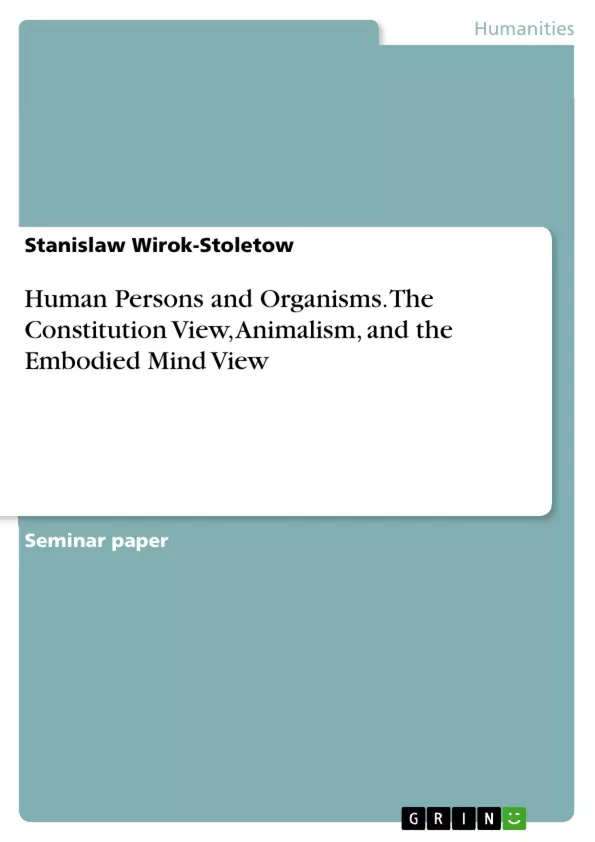There is not too much agreement in philosophy about what a person is, how and when persons do persist over time or who a person is. And as it is usually the case when philosophical problems are discussed but not resolved, new questions and problems arise in the course of the debate and the argument shifts away from its starting point. Such a shift gave rise to the problem that is at the heart of my thesis.
We consider us to be persons and humans to be biological organisms. How do those two facts relate to each other and what can be inferred from them?
Inhaltsverzeichnis (Table of Contents)
- Introduction
- The Constitution View and Animalism
- The Constitution View of Human Persons
- Animalism
- The Embodied Mind View
- Conclusion
Zielsetzung und Themenschwerpunkte (Objectives and Key Themes)
This thesis delves into the complex relationship between human persons and biological organisms, specifically exploring the debate between the Constitution View and Animalism. The aim is to analyze and contrast these opposing perspectives, ultimately evaluating the merits of an alternative view, the Embodied Mind View.
- The nature of human persons and their relation to biological organisms
- The Constitution View and its concept of human persons as constituted by, but not identical to, their organisms
- Animalism and its assertion that human persons are identical with their organisms
- The Embodied Mind View as a potential alternative, proposing that persons are the controlling part of their organisms
- The implications of these views for our understanding of personal identity, consciousness, and moral status
Zusammenfassung der Kapitel (Chapter Summaries)
- Introduction: The author introduces the debate surrounding the nature of human persons and their relationship to biological organisms. The thesis aims to investigate the relationship between these concepts, exploring the implications for our understanding of personhood, identity, and moral status.
- The Constitution View and Animalism: The author presents two contrasting views on the person-organism relationship: the Constitution View, which claims that persons are constituted by, but not identical to, their organisms; and Animalism, which asserts that persons are identical with their organisms. The author examines the arguments of proponents from each perspective, highlighting their central claims and providing a basis for comparison.
- The Constitution View of Human Persons: This section delves into the Constitution View, focusing on the arguments presented by Lynn R. Baker. It explores the view that persons are characterized by a "first-person perspective" and that this capacity is not identical with the human organism but rather constituted by it. The author examines the concept of a "constitution relation" as described by Baker, outlining the key conditions and implications for understanding the relationship between persons and their bodies.
Schlüsselwörter (Keywords)
The core keywords and focus topics include: human persons, biological organisms, Constitution View, Animalism, Embodied Mind View, first-person perspective, constitution relation, personal identity, consciousness, moral status.
Frequently Asked Questions
What is the difference between the Constitution View and Animalism?
Animalism claims that human persons are identical to their biological organisms. The Constitution View argues that persons are constituted by, but not identical to, their organisms.
What is the 'first-person perspective' in the Constitution View?
According to Lynn R. Baker, this perspective is the defining capacity of personhood, allowing an individual to think of themselves as themselves, which the organism alone cannot do.
What does the Embodied Mind View propose?
This view suggests that persons are the controlling part of their organisms (typically the brain or mind), rather than being identical to the whole biological animal.
Why is the relationship between persons and organisms a philosophical problem?
It raises questions about personal identity over time, when a person begins or ends, and what determines our moral status as humans.
Can a person exist without an organism according to these views?
Animalists would say no, as the person is the organism. Constitution View proponents might allow for different constitution relations, but currently, human persons are constituted by human organisms.
What are the implications for consciousness in this debate?
The debate explores whether consciousness is a property of the whole biological animal or a specific mental state that defines the person as a separate entity from the body.
- Quote paper
- Stanislaw Wirok-Stoletow (Author), 2016, Human Persons and Organisms. The Constitution View, Animalism, and the Embodied Mind View, Munich, GRIN Verlag, https://www.grin.com/document/376739



